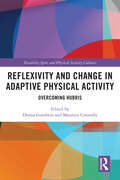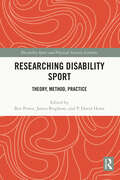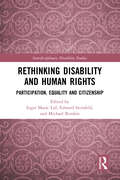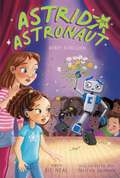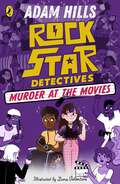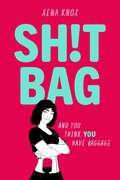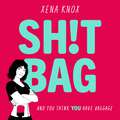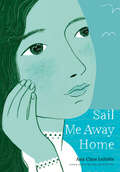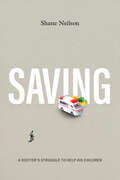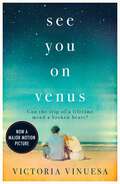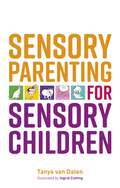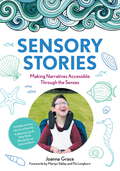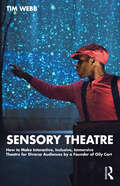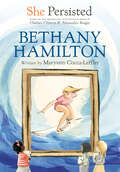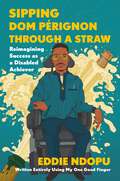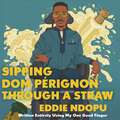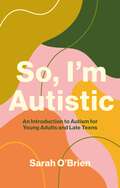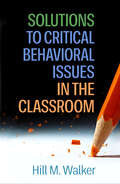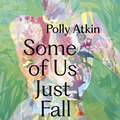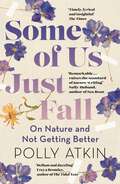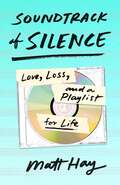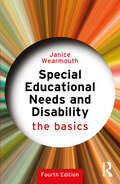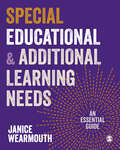- Table View
- List View
Reflexivity and Change in Adaptive Physical Activity: Overcoming Hubris (Disability Sport and Physical Activity Cultures)
by Donna Goodwin and Maureen ConnollyThis provocative and challenging book argues for the vital importance of critical self-reflexion in the field of adaptive physical activity (APA). It makes a powerful case for embracing discussions of the harm caused by ableist assumptions of the ideal body, maximizing capabilities and perfecting normativebased movement that dominate contemporary discourse in APA, and calls for more critical introspection about what APA is, how it is performed, and what might be needed to bring a collaborative relational ethic to this field. This book focuses on two key themes: Firstly, how ableism as a foundational belief system of APA is present in the undergraduate curriculum, professional preparation, professional practice, and organizational policies. Secondly, how to make the comfortable uncomfortable by openly debating the harm that results from non-reflexive (nondisabled) hubris in APA. The goal is to spark an exchange of ideas among scholars, practitioners, and organizational leaders and therefore to shift the paradigm from one of professional expertism to one that centres disability wisdom holders, bringing a fundamental change yo how we perform adaptive physical activity. This book is important, progressive reading for anybody with an interest in adaptive physical activity, adapted physical education, disability sport, inclusive education, the philosophy and ethics of disability and sport, or disability in wider society.
Researching Disability Sport: Theory, Method, Practice (Disability Sport and Physical Activity Cultures)
by P. David Howe Ben Powis James BrightonMarking a new direction for disability sport scholarship, this book explores cutting-edge issues and engages creatively with contemporary approaches to research in this important emerging discipline. Featuring contributions from leading and up-and-coming scholars around the world, the book’s wide-ranging chapters offer novel perspectives on the relationship between theory, method and empiricism in disability sport research and highlight how researchers can be both innovative and informed when entering the field. It also explores methodological considerations when conducting disability sport research, including social, cultural, and political reflections of the research process from disabled and non-disabled academics. This much-needed resource supports disability sport scholars in developing a conceptual grounding in the subject and establishes a space for intersectional accounts of sport and physical activity which challenge homogenous understandings of disability. This book is essential reading for any student or researcher working in disability sport, adapted physical activity, or adapted physical education, and a valuable reference for anybody with an interest in the sociology of sport, disability studies, cultural studies, the body, or research methodology.
Rethinking Disability and Human Rights: Participation, Equality and Citizenship (Interdisciplinary Disability Studies)
by Edward Steinfeld Michael Rembis Inger Marie LidThis book examines the role of disability in the right to political and social participation, an act of citizenship that many disabled people do not enjoy.The disability rights movement does not accept the use of disability to create limits on citizenship, which poses challenges for contemporary societies that will become ever greater as the science and technology of enhancing human abilities evolves. Comprised of eight chapters, three interludes, and a postscript written by leading scholars and disability rights activists, the book explores citizenship for people with disabilities from an interdisciplinary perspective using the United Nations Convention on the Rights of Persons with Disabilities (CRPD) as a point of departure and the concept of universal design as a strategy for actualizing full citizenship for all. Situating disability in its historical and cultural contexts, the authors offer directions for rethinking citizenship, including implications for access to the built environment, information and communication systems, education, work, community life and politics. This book will be of interest to all scholars and students working in disability studies, planning, architecture, public health, rehabilitation, social work, and education.
Robot Rebellion (Astrid the Astronaut #4)
by Rie NealThis is the fourth book in the Astrid the Astronaut chapter book series about a young girl determined to be the first hard-of-hearing astronaut in space!When Astrid and the rest of the Shooting Stars find out that their teacher, Ms. Ruiz, is about to celebrate a big birthday, they band together to create the perfect gift. Her big day happens to be the same as the upcoming robotics competition and they decide to do something there. With the help of Astrid&’s big sister, Stella, they program their robot to do a fun dance and give Ms. Ruiz a sweet surprise. But on the day of the competition, the data for the Shooting Stars robot somehow gets mixed up with another one! Will their fun present end up being a major malfunction?
Rockstar Detectives: Murder at the Movies (Rockstar Detectives #2)
by Adam HillsThe brilliant and laugh-out-loud second mystery from comedian Adam Hills featuring a young detective dream team. The perfect read for fans of Sharna Jackson, Robin Stevens and David Baddiel!Meet Charley - a totally ordinary 13-year-old, who's also an international singing sensation.Meet George - Charley's best friend, social media whizz, and budding comedian.Charley and George are in Sydney, where Charley is filming her first movie. But when mysterious accidents begin to happen whenever Charley's on set, the duo suspect someone isn't as excited about her big screen debut as they are . . .No one else seems to believe that Charley's in real danger and anyone - from the bad-tempered director to Charley's rude co-star - could be a suspect. Can the detective dream team solve their second mystery, wrap the movie - and keep Charley in one piece?The fabulously funny new novel from award-winning comedian and author of ROCKSTAR DETECTIVES, Adam Hills.Praise for the first book in the ROCKSTAR DETECTIVES series:'A delightfully funny book with a big, big heart' - David O'Doherty'Fast-moving, lively, full of jokes and humour and with a satisfying puzzle to be solved, this makes for perfect escapist reading' - LoveReading4Kids
SH!T BAG: A funny, messy story about life with an ostomy bag
by Xena KnoxCOSMOPOLITAN'S BEST NEW BOOKS OUT IN JUNE 2023'Funny, direct ... and romantic' - The Guardian'Compelling and insightful' - Glamour'Whip-smart' - Irish Independent'Come along with me on this sh!tty ride or bail out now. It's your choice . . .'When Freya collapses and wakes up with a temporary ileostomy bag on her stomach, her dreams of the perfect summer go down the toilet. Instead of partying in the Algarve, she's packed off to 'Poo Camp' - a place for kids with bowel disease to 'bond'.And things can only get worse. Someone has started calling her 'Sh!t Bag' . . . and it's catching on.Freya decides to live up to the nickname, raging at her friends, her ex and the world. Only her campmate Chris seems to see past her new attitude . . .Can Freya get her sh!t together or will she end up with just her bag by her side?A fresh, fierce and funny story about what happens when life literally goes to sh!t.
SH!T BAG: A funny, messy story about life with an ostomy bag
by Xena KnoxA fresh, fierce and sharply funny YA debut about breaking taboos and learning how to cope when life literally goes to shit. Perfect for fans of Sex Education, Not My Problem by Ciara Smyth and Bryony Gordon.When sixteen-year-old Freya collapses and wakes up to discover a surgeon has given her a temporary ostomy bag, her dreams of the perfect summer go down the toilet. Suddenly, it's goodbye, Marbella and hello, poo camp when her parents send her to a specialist camp in the Scottish Highlands for children with bowel disease. With the help of her campmate Chris, Freya slowly learns to live with her bag, but, back in the real world, she is determined to get her old life back and prove to her classmates that she's more than just 'Shitbag' by winning back her ex-boyfriend, Lockie. But as Freya's feelings for Chris grow, shit is sure to hit the fan, and Freya could end up with only her bag by her side ...©2023 Xena Knox Limited (P)2023 Hodder & Stoughton Limited
Sail Me Away Home (Show Me a Sign)
by Ann Clare LeZotteThis gripping, stand-alone story, set in the world of the award-winning Show Me a Sign and Set Me Free, completes a unique and unforgettable trilogy that centers the Deaf experience.As a young teacher on Martha's Vineyard, Mary Lambert feels restless and adrift. So when a league of missionaries invite her to travel abroad, she knows it's a once in a lifetime opportunity. Paris is home to a pioneering deaf school where she could meet its visionary instructors Jean Massieu and Laurent Clerc-and even bring back their methods to help advance formal deaf education in America!But the endeavor comes at a cost: The missionaries' plan to "save" deaf children is questionable at best-and requires Mary's support. What's more, the missionaries' work threatens the Wampanoag and other native peoples' freedom and safety. Is pursuing Mary's own goals worth the price of betraying her friends and her own values?So begins a feverish and fraught adventure, filled with cunning characters, chance encounters, and new friendships. Together with Show Me a Sign and Set Me Free, this stunning story will enrich your understanding of Deaf history and culture, and forever alter your perspective on ability and disability.
Saving: A Doctor’s Struggle to Help His Children
by Shane Neilson“ Shane Neilson is a brilliant writer and his work deserves to be better known. There hasn' t been such a poignant and harrowing memoir of fatherhood in Canada since Ian Brown' s The Boy in The Moon.” – Karen Connelly, author of The Change RoomWhen his two-year-old son develops epilepsy, Shane Neilson and his wife, Janet, struggle to obtain timely care for him while at the same time navigating their young daughter' s diagnosis of childhood depression. His family' s journey through a sometimes inadequate and often uncaring medical system is informed by Shane' s personal history of bipolar disorder and his professional experience with disability as a practicing physician.
See You on Venus
by Victoria VinuesaThe runaway romance now a major motion picture starring Virginia Gardner and Alex Aiono! Two teens embark on a journey to Spain to discover the meaning of love, death and everything in between in this star-crossed love story perfect for fans of The Fault in our Stars, Five Feet Apart and All the Bright Places.Mia has had a heart condition her whole life. She&’s not afraid of dying but something has always stopped her from her biggest fear: tracking down her biological mother in Spain . . . until now. Kyle has always been the life of the party . . . that was until the car accident that killed his best friend. Now he&’s willing to do just about anything to escape his reality. After a twist of fate, Mia and Kyle meet and make the decision to travel to Spain together for a once-in-a-lifetime road trip. But what starts as a hunt for Mia&’s mother soon turns into a whirlwind summer romance. Did the universe bind them together to change how they feel about love and death forever?See You on Venus is a heartwrenching novel perfect for readers looking for: Contemporary teen romance books Complex emotional YA stories Books to finish before or after seeing the film TikTok favourites like If He Had Been With Me, Girl in Pieces and You've Reached Sam Colleen Hoover books
Sensory Parenting for Sensory Children
by Tanya Van DalenWhen your child dysregulates, half the battle is managing your own response. In the moment, you're at the mercy of many competing feelings: embarrassment, fear, panic, exhaustion. Being able to recognise your own triggers and behaviours in order to stay calm and provide the best support to your child, is not a skill that comes easily. Helping parents and carers to reflect on themselves, think about how they manage sensory meltdowns and give them some simple ideas on how to manage their own emotions in order to help their child, this is a short and simple guide for those that parent or care for a child with sensory needs, or a sensory processing disorder (SPD). Drawing on Porges' polyvagal theory, and using easy-to-follow animal analogies, this will empower parents to build empathy for their child, and themselves.
Sensory Stories to Support Additional Needs: Making Narratives Accessible Through the Senses
by Joanna GraceSensory Stories are short stories of a few lines which are brought to life through a selection of meaningful sensory experiences. They are particularly beneficial for people with Sensory Processing Disorder (SPD), Profound and Multiple Learning Difficulties (PMLD) and Autistic children or adults. Sensory stories are perfect for introducing new sensory environments in a safe, interactive way to help reduce associated anxieties and open up new avenues for communication and play.This updated edition is packed with original ready-to-use sensory stories, including 5 additional guest sensory stories by authors from around the world and your very own story template to create a sensory experience personalised for each person. With exclusive 'how to' video content and digital lesson plans, this book is the essential tool for introducing the transformative multi-sensory storytelling method into your home, classroom or group setting.Using everyday items and step-by-step instructions to make incorporating sensory stories accessible and simple, it has never been easier to create inclusive and fun sensory experiences to enhance the lives of those with additional needs.
Sensory Theatre: How to Make Interactive, Inclusive, Immersive Theatre for Diverse Audiences by a Founder of Oily Cart
by Tim WebbSensory Theatre: How to Make Interactive, Inclusive, Immersive Theatre for Diverse Audiences by a Founder of Oily Cart is an accessible step-by-step guide to creating theatre for inclusive audiences, such as young people on the autism spectrum or affected by other neuro-divergent conditions and children under two. Conventional theatre relies on seeing and hearing to involve its audience; sensory theatre harnesses the power of five or more senses to address its participants who have different ways of relating to the world around them. This book is an insightful history of Oily Cart and its pioneering development of work for the very young, including Baby Theatre, and for neuro-divergent audiences including those on the autism spectrum. It gives a clear introduction to the fundamental concepts of this theatre, suggests a host of practical techniques drawn from over forty years of experience, and describes some of Oily Cart’s most radical innovations, including theatre on trampolines, in hydrotherapy pools, and with flying audiences in the company of aerial artists. The book also includes copious photos from the Oily Cart’s archives and links to videos examples of the company’s work. Readers will learn how to: Research the intended audience while not being led astray by labels. Create a welcoming, immersive sensory space in classrooms, nurseries, school halls, and playgrounds. Devise sensory stories that can be adapted to suit different audiences. Recruit, audition, cast, and run rehearsals. Ensure that the production is truly sensory and interactive. Written for Theatre for Young Audiences, Drama in Education, and specialized Applied Theatre courses, as well as educators and theatre practitioners interested in creating inclusive, interactive productions, Sensory Theatre offers a goldmine of ideas for making work that connects with audiences who can be the hardest to reach.
She Kept Dancing: The True Story of a Professional Dancer with a Limb Difference
by Sydney Mesher Catherine LaudoneThis warm and inviting picture book, cowritten with Catherine Laudone and brightly illustrated by Natelle Quek, takes young readers along on Sydney’s journey—through the joyous ups as well as the crushing downs—and tells the story of how through it all, she kept dancing.No two dances were the same. Each one was beautiful because it was different—just like how Sydney’s body was also beautiful because it was different.Sydney Mesher was born with ten toes and five fingers. But it was her toes that her mom noticed first. "I can tell she’s going to be a dancer," she said.And it turned out Mom was right—after years of hard work, Sydney eventually danced her way onto the famous stage of Radio City Music Hall, becoming the first Rockette with a visible disability.
She Persisted: Bethany Hamilton (She Persisted)
by Maryann Cocca-Leffler Chelsea ClintonInspired by the #1 New York Times bestseller She Persisted by Chelsea Clinton and Alexandra Boiger, a chapter book series about women who spoke up and rose up against the odds--including Bethany Hamilton!Bethany Hamilton learned to surf when she was three years old, and she joined—and won—many surfing competitions as a child. When she was thirteen, while she was surfing one morning, a shark suddenly attacked her and bit off her left arm. Through hard work, courage, and faith, Bethany persisted and went on to reach her dream of becoming a professional surfer. Along the way, she used her experience to provide inspiration and comfort to surfers and non-surfers alike.In this chapter book biography by award-winning author Maryann Cocca-Leffler, readers learn about the amazing life of Bethany Hamilton--and how she persisted. Complete with an introduction from Chelsea Clinton, black-and-white illustrations throughout, and a list of ways that readers can follow in Bethany Hamilton's footsteps and make a difference! A perfect choice for kids who love learning and teachers who want to bring inspiring women into their curriculum.And don&’t miss out on the rest of the books in the She Persisted series, featuring so many more women who persisted, including Harriet Tubman, Marian Anderson, Oprah Winfrey, Ruby Bridges, and more!
Sipping Dom Pérignon Through A Straw (Father Anselm Novels #13)
by Eddie Ndopu'Uncompromising... A masterful writer poised for even more great success' - Forest Whitaker, Academy award-winning actorA memoir, penned with one good finger, about being profoundly disabled and profoundly successful.Global humanitarian Eddie Ndopu was born with spinal muscular atrophy, a rare degenerative motor neuron disease affecting his mobility. He was told that he wouldn't live beyond age five and yet, Ndopu thrived. He grew up loving pop music and haute couture, lip syncing to the latest hits, and was the only wheelchair user at his school, where he flourished academically. By his late teens, he had become a sought-after speaker, travelling the world to give talks on disability justice. When he is later accepted on a full scholarship into Oxford University, he soon learns that it's not just the medical community he must defy - it's the educational one too. In Sipping Dom Pérignon Through a Straw, we follow Ndopu, sporting his oversized, bejewelled sunglasses, as he scales the mountain of success, only to find exclusion, discrimination, and neglect waiting for him on the other side. As he soars professionally, sipping champagne with world leaders, he continues to feel the loneliness and pressure of being the only one in the room. Determined to carve out his place in the world, he must challenge bias at the highest echelons of power and prestige. Searing, vulnerable and inspiring, Ndopu's remarkable journey to reach beyond ableism, reminds us never to let anyone else define our limits.'Unflinching honesty and vulnerability... Prepare to be moved, enlightened, and profoundly touched' Sabrina Dhowre Elba, actress, model and UN Goodwill Ambassador
Sipping Dom Pérignon Through A Straw (Father Anselm Novels #13)
by Eddie NdopuAn inspirational and truly intersectional memoir from global humanitarian and social justice advocate Eddie Ndopu-a queer, Black wheelchair user and one of the UN Secretary-General's 17 Advocates for the SDGs.There are many more examples throughout my life where, if I had listened to people who told me to be comfortable with merely existing, I would now be a shrunken version of myself. I would not have emerged as one of Amnesty International's most influential campaigners straight out of college. I would not have gone on to graduate from Oxford. I would not have been appointed as a United Nations SDG Advocate. I would be eating mashed-up vegetables instead of drinking Dom Pérignon through a straw.Eddie Ndopu was born in 1990 with Spinal Muscular Atrophy (SMA), a rare degenerative motor-neuron disease, and told that he wouldn't live beyond age five. Now, thirty-one years old and stronger than ever, he continues to celebrate each turn around the sun as an existential defiance of the odds.Having fought his way through South Africa's archaic and ableist school system, Eddie became the first-ever disabled African to be given a full scholarship to Oxford University. Gay, Black and a wheelchair user, he is now an eminent thought-leader and holds positions at two of the most important organizations on the planet: the United Nations and the World Economic Forum.From flirting with diplomats on dancefloors to wearing lipstick to board meetings, Eddie has spent his life challenging the bias of those who occupy the highest echelons of power and prestige. Through redefining the boundaries of identity and ability, Sipping Dom Pérignon Through a Straw is Eddie's odds-obliterating story that illustrates what true leadership can look like and reminds us to never forget that you are bigger and more expansive than the space you currently occupy.(P) 2023 Hachette Audio
So, I'm Autistic: An Introduction to Autism for Young Adults and Late Teens
by Sarah O'Brien'There isn't a secret manual outlining exactly how to get through your teens and young adulthood as an autistic individual, but this book provides a script for how to do what adulthood will make you do anyway, in a way that is most accessible for you".You've just received an autism diagnosis, so why do you still feel so lost when it comes to what autism actually means for you?Written by autistic advocate Sarah O'Brien, this book gives a much-needed introduction into what autism is and removes the myths, stereotypes and stigma that surround it. Sarah provides insights into what to do after diagnosis and how to approach and navigate the process of informing those in your life, from your family and friends to your teachers or manager at work. Utilising her own experience of feeling lost after diagnosis and navigating all of the 'firsts' of adolescence and young adulthood Sarah provides an honest and friendly voice to guide you through it all.Intelligent and clearly-written, this is the fact-led and information-rich resource that will answer your questions about autism, introduce you to your new community and set you up to thrive as an autistic adult.
Solutions to Critical Behavioral Issues in the Classroom
by Hill M. WalkerThis highly practical reference is organized around the problem behaviors that K–6 teachers see as the greatest barriers to student success--and the positive behaviors they value the most. Of particular value to educators, the book matches proven intervention techniques to specific target behaviors. Hill M. Walker presents exemplary strategies for managing such classroom challenges as defiance, low motivation, and aggression. He also reviews ways to build all students' skills for following directions, staying on task, coping with frustration, getting along with peers, and more. The book includes illustrative case examples and a section that clearly explains key principles of behavior management. Reproducible handouts and forms can be downloaded and printed in a convenient 8 1/2" x 11" size.
Some of Us Just Fall: On Nature and Not Getting Better
by Polly Atkin'It raises the standard of nature writing. This is both radical manifesto and activism in book form' Sally Huband, author of Sea Bean'Long before I knew I was sick, I knew I was breakable . . .'A raw and exquisite meditation on chronic illness and our place within the landscape, from prize-winning poet Polly Atkin.After years of unexplained health problems, Polly Atkin's perception of her body was rendered fluid and disjointed. When she was finally diagnosed with two chronic conditions in her thirties, she began to piece together what had been happening to her - all the misdiagnoses, the fractures, the dislocations, the bone-crushing exhaustion, the not being believed.Some of Us Just Fall combines memoir, pathography and nature writing to trace a fascinating journey through illness, a journey which led Polly to her current home in the Lake District, where outdoor swimming is purported to cure all, and where every day Polly uses the natural world to help tame her illness. Polly delves into the history of her two genetic conditions, uncovering how these illnesses were managed (or not) in times gone by and exploring how best to plan for her own future. From medical misogyny and gaslighting, to the illusion of 'the nature cure', this essential, beautiful and deeply personal book examines how we deal with bodies that diverge from the norm, and why this urgently needs to change. This is not a book about getting better, this is a book about living better with illness.(P)2023 Hodder & Stoughton Limited
Some of Us Just Fall: On Nature and Not Getting Better
by Polly Atkin'It raises the standard of nature writing. This is both radical manifesto and activism in book form'Sally Huband, author of Sea Bean'Defiant and dazzling'Freya Bromley, author of The Tidal Year'Essential reading'Jessica J. Lee, author of Turning'Long before I knew I was sick, I knew I was breakable . . .'After years of unexplained health problems, Polly Atkin's perception of her body was rendered fluid and disjointed. When she was finally diagnosed with two chronic conditions in her thirties, she began to piece together what had been happening to her - all the misdiagnoses, the fractures, the dislocations, the bone-crushing exhaustion, the not being believed.Some of Us Just Fall combines memoir, pathography and nature writing to trace a fascinating journey through illness, a journey which led Polly to her current home in the Lake District, where outdoor swimming is purported to cure all, and where every day she turns to the natural world to help tame her illness. Polly delves into the history of her two genetic conditions, uncovering how these illnesses were managed (or not) in times gone by and exploring how best to plan for her own future. From medical misogyny and gaslighting, to the illusion of 'the nature cure', this essential, beautiful and deeply personal book examines how we deal with bodies that diverge from the norm, and why this urgently needs to change.This is not a book about getting better. This is a book about living better with illness.
Soundtrack of Silence: Love, Loss, and a Playlist for Life
by Matt HayAn inspiring memoir of a young man who discovered he was going completely deaf just at the moment he’d fallen in love for the first time.As a child, Matt Hay didn’t know his hearing wasn’t the way everyone else processed sound—because of the workarounds he did to fit in, even the school nurse didn’t catch his condition at the annual hearing and vision checks. But by the time he was a prospective college student and couldn’t pass the entrance requirements for West Point, Hay’s condition, generated by a tumor, was unavoidable: his hearing was going, and fast.A personal soundtrack was Hay’s determined compensation for his condition. As a typical Midwestern kid growing up in the 1980s whose life events were pegged to pop music, Hay planned to commit his favorite songs to memory. He prepared a mental playlist of the bands he loved and created a way to tap into his most resonant memories. And the track he needed to cement most clearly? The one he and his new girlfriend, Nora—the love of his life—listened to in the car on their first date.Made vivid with references to instantly recognizable songs—from the Eagles to Elton John, Bob Marley to Bing Crosby, U2 to Peter Frampton—Soundtrack of Silence asks readers to run the soundtrack of their own lives through their minds. It’s an involving memoir of loss and disability, and, ultimately, a both unique and universal love story.
Special Educational Needs and Disability: The Basics (The Basics)
by Janice WearmouthSpecial Educational Needs and Disability provides a clear, coherent overview of the historical development of the field of special educational, or additional learning or support needs and disability, and discusses important past and current social and political contexts in which this took place, as well as changes in the law across time. It offers broad coverage of a range of needs and disabilities, and how to effectively identify and support those young people who experience such needs. This revised fourth edition covers recent legislative changes across the UK, an expanded discussion of key areas such as social, emotional, and mental health, a new chapter on literacy difficulties, and further fair, balanced, and open discussion of up-to-date evidence that indicates how young people who experience barriers to their learning are affected by factors associated with such marketisation, for example competition between schools and the academies programme. Special Educational Needs and Disability serves as essential reading for trainee and practising teachers, members of governing boards in schools and colleges, policymakers, and all those working directly with learners and their families.
Special Educational and Additional Learning Needs: An Essential Guide
by Janice WearmouthThis essential text supports students to develop their understanding of children and young people with special educational, and additional support needs. Up to date with the current Code of Practice and legislation, the text offers chapters on each key area of need within Early Years settings, schools and colleges, empowering readers with the confidence to address these needs effectively. The book includes case studies and examples helping to put theory into practice, in addition to learning and teaching points throughout the book, encouraging students to think critically of how they would manage particular issues. Janice Wearmouth is Professor of Education at the University of Bedfordshire.
Special Educational and Additional Learning Needs: An Essential Guide
by Janice WearmouthThis essential text supports students to develop their understanding of children and young people with special educational, and additional support needs. Up to date with the current Code of Practice and legislation, the text offers chapters on each key area of need within Early Years settings, schools and colleges, empowering readers with the confidence to address these needs effectively. The book includes case studies and examples helping to put theory into practice, in addition to learning and teaching points throughout the book, encouraging students to think critically of how they would manage particular issues. Janice Wearmouth is Professor of Education at the University of Bedfordshire.
